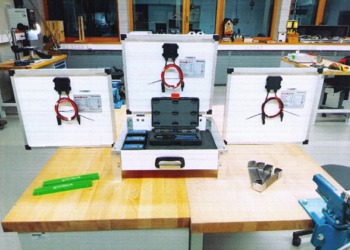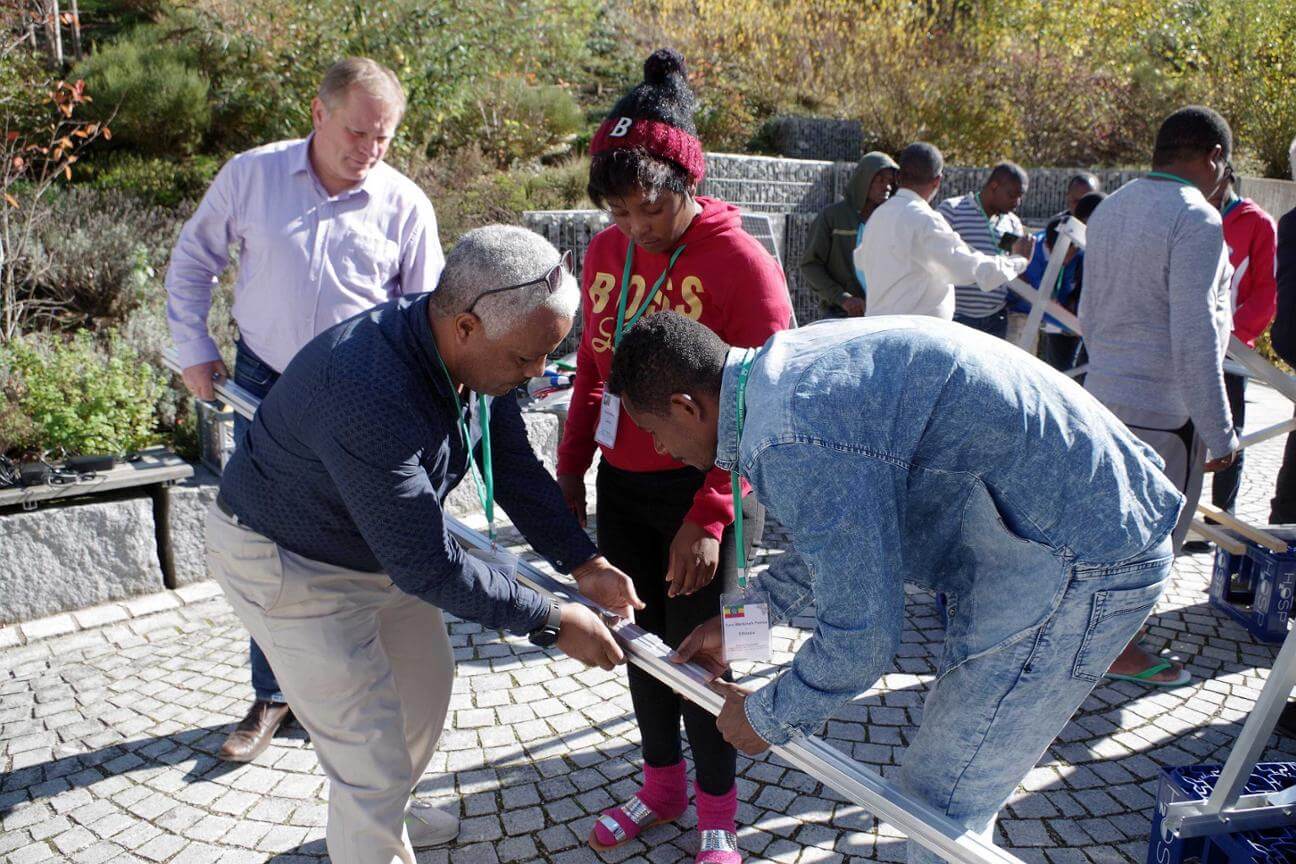Projects VET4Africa
The basis of all projects is the holistic training in the combination of theoretical knowledge and practical work. This is in line with the long tradition of dual vocational education in Germany.
Special emphasis is placed on pedagogical concepts and fun with technology. The aquired knowledge is always aiming for practical realization. Thus, the training does not stop at photovoltaics, but is combined with examples of practical application such as drinking water supply or electric mobility. Through many measurement tasks, the participants deepen their basic knowledge and train the skills for troubleshooting and professional quality control.
At the end of the course each participant receives a certificate of successful participation.
PV1: Modular PV training system
 This course is the basis for all work in the field of energy production using photovoltaics. Basic knowledge of physics and electrical engineering is a prerequisite for successful participation.
This course is the basis for all work in the field of energy production using photovoltaics. Basic knowledge of physics and electrical engineering is a prerequisite for successful participation.
In this course, participants first learn the theoretical principles of electrical and energy engineering and then cross-link this knowledge with photovoltaics. A comprehensive compendium and teaching materials are available for this purpose.
From the very beginning, the teaching of the theoretical contents is supplemented by practical and illustrative experiments, and loosened up by group work.
An integral part of the course is the construction of a PV training system in the form of a suitcase with several PV modules, DC charge controllers and batteries with an output of up to 100W. The case kit also contains measuring instruments and all components necessary for the training.
With the construction of this small energy plant, the theoretical part of the training concept is implemented in a concrete practical example. On the basis of harmless direct current voltages up to 20 V and many measurement tasks, both manual skills can be practiced and the theoretical learning objectives of the course can be deepened and applied.
The systems built will become the property of each course participant at the end of the course and will serve as a mobile laboratory for further training in their own country.
Here you can see a video: presentation of the PV1 training system 2020 (unboxing)
PV2: Development of a house or village power supply
 While PV 1 teaches the basics of electrical and solar technology, PV 2 will be used to plan and construct real energy supply systems up to the level of a village power supply. The theoretical knowledge from PV 1 is to be implemented in holistic technical projects. Due to the extensive work and higher costs for the production of these complex energy systems, 3 complete systems per course are to be created in group work, which can be disassembled and reused at the end of the course. The aim of the training is to qualify the participants to such an extent that they can install, maintain and service similar systems with locally available components.
While PV 1 teaches the basics of electrical and solar technology, PV 2 will be used to plan and construct real energy supply systems up to the level of a village power supply. The theoretical knowledge from PV 1 is to be implemented in holistic technical projects. Due to the extensive work and higher costs for the production of these complex energy systems, 3 complete systems per course are to be created in group work, which can be disassembled and reused at the end of the course. The aim of the training is to qualify the participants to such an extent that they can install, maintain and service similar systems with locally available components.
This course is based on the contents of the course PV1 and expands the participants' skills in the design, planning, testing and maintenance of stand-alone photovoltaic systems taking into account local conditions and consumption. The aim is to supply the most important consumers of a building with electrical energy self-sufficiently with the help of an island system.
With the written teaching material, the basic safety standards according to VDE or IEC are taught and first measurement exercises for safety testing of electrical systems (E-Check) are carried out. An essential part of the practical qualification is professional planning, functional construction and safety documentation with maintenance of a 230/400 V AC power supply. For this purpose, a powerful PV generator with buffer batteries on mobile racks is set up as an energy source.
The necessary theoretical knowledge, especially the legal safety requirements according to the "recognized rules of electrical engineering", should already be known and serve as a basis for all construction decisions. Therefore, participants who have already completed the PV 1 module or have relevant experience in the field of electrical engineering are mainly eligible for these courses.









